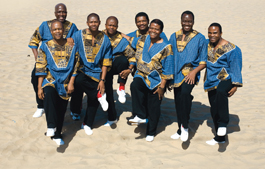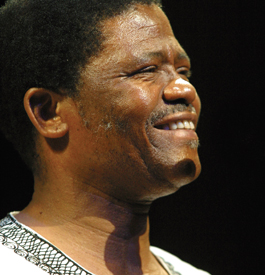home | metro santa cruz index | features | santa cruz | feature story

Zulanders: On its new album, Ladysmith Black Mambazo strives to connect South Africa's youth with the country's Zulu heritage.
Zulu Revival
A rejuvenated Ladysmith Black Mambazo reconnects young South Africans with their heritage.
By Andrew Gilbert
WHEN Joseph Shabalala announced his retirement last year from Ladysmith Black Mambazo, it seemed like the end of an epoch. For more than four decades, the amazing male choral group that he founded served as the most vivid and mellifluous voice calling for freedom, justice and peace in South Africa. While turning over leadership of the group to his son Thamsanqa, Shabalala said, "The mission and message will continue."
But when the eight-member ensemble hits the West Coast for a series of gigs, including a three-night run at Yoshi's that opens on Friday, and a Kuumbwa-presented performance at the Rio Theatre on Monday, Shabalala will be holding forth from his usual spot at center stage. After a brief hiatus, it turned out that the legendary singer wasn't ready to relinquish the reins of a group that helped change the course of history.
"I think he missed it," says tenor Albert Mazibuko, Shabalala's longtime vocal compatriot. "I read that he was retiring on the news and we thought he was just joking. I told him, now that you announced you're going to leave the group I might follow you. He is grooming his sons to lead Ladysmith, but he decided he didn't want to stay home, and Joseph is very much alive in the group."
Despite the retracted retirement, Ladysmith has undergone a stark generational change in recent years. The ensemble is still largely drawn from two related families, the Shabalalas and Mazibukos, but after several members were killed in South Africa's endemic violence, the majority of the ensemble consists of Shabalala's sons and cousins.
"It has changed in a good way," says Mazibuko, Ladysmith's only other founding member. "We've been joined by young people who bring new energy and new ideas, and help us a lot when collaborating with other groups. They're familiar with music nowadays, unlike us. We want them to carry on with the music."
Ladysmith's mission has always extended far beyond the gorgeous harmonies and cascading songs drawn from traditional isicathamiya, a Zulu vocal style accompanied by graceful group choreography. A decade ago, Shabalala launched a foundation under the group's name to promote isicathamiya among a young generation entranced by hip-hop and Western pop music. Much more is being lost in the post-apartheid era, as young South Africans grow up with little sense of history.
Released last year in the United States on Heads Up, Ladysmith's recent CD, Ilembe: Honoring Shaka Zulu, won the 2009 Grammy Award for Traditional World Music Album. It was conceived as part of a consciousness-raising campaign when Shabalala and Mazibuko realized that even the younger members of the group didn't know much about Shaka Zulu, the legendary king who forged the Zulu empire in the early 19th century. While his legacy is still controversial, Shaka Zulu provided a potent example of determination and resistance in the struggled against apartheid.
"Shaka Zulu made us strong when we were growing up," Mazibuko says. "But when we talk about him with the young members, they never heard the story. It brought the idea to our mind that we should write some songs and dedicate the album to him. We talk about him a lot. It's a great inspiration to everyone, that he grew up raised by single parent, never complained and achieved what he wanted to achieve. You don't have to complain about the past. Do what you want to do."
While Ladysmith celebrates traditional South African culture, the group continues its mission to bring isicathamiya to the rest of the world. The group's latest album is My Dream--African Sounds, a glorious collaboration with the SABC Choir that combines Zulu vocals with the soaring strains of gospel, providing a double dose of soul. It's just the latest step in Shabalala's brilliant campaign to transform a rigorous, highly competitive folk art into an international musical force.
For most Americans, Ladysmith Black Mambazo appeared out of nowhere in 1986, with the release of Paul Simon's celebrated album Graceland. Providing the gorgeously textured vocals on tunes such as "Homeless" and "Diamonds On the Souls of Her Shoes," the a cappella group seemed to meld perfectly with Simon's lilting melodies and impressionistic lyrics.
While Simon came under sharp criticism for alleged musical imperialism, the group is still grateful for the opportunities he helped provide. After Simon produced the group's 1987 Grammy-winning album Shaka Zulu for Warner Bros. Ladysmith became a global force, contributing to film soundtracks (Coming to America, A Dry White Season and Cry the Beloved Country), recording with Stevie Wonder, Julia Fordham, George Clinton and Dolly Parton, and creating a number of powerful theatrical productions.
Most importantly, the group helped give voice to the resurgent spirit of South Africa in the post-apartheid era. Embraced by Nelson Mandela, Ladysmith accompanied the future president and then-South African President F.W. de Klerk to the Nobel Peace Prize ceremony in Oslo in 1993. The next year, the group sang at Mandela's inauguration.
"When Mandela was released from prison he called us at home," Mazibuko recalls. "He said he wanted us to be with him when he was celebrating his birthday. When we're onstage and he came up, singing with us, he said, 'This is the kind of music I like. I listened to it when I was in jail and it gave me great strength.'"

Retired from retirement: Group founder Joseph Shabalala's 2008 announcement that he was turning over the reins of Ladysmith Black Mambazo proved premature.
Dreamworks
Much like the blues, isicathamiya arose at a time when a people most needed strength. The sound was born in the brutal working conditions in South African mines. The vocal style spread to villages and townships when black mine workers returned home and brought isicathamiya back with them. By the '40s, it had become a highly evolved vocal and dance form, with regular competitions to name the best group.
"If you look at the tradition of Ladysmith's vocal work, it comes from a long history of choral singing in South Africa," says Pascal Bokar, a respected Senegalese guitarist who has lectured widely on African musical forms. "The style of singing is very old, and represents the true tradition of Zulu music, and their work comes out of the tradition of the urban workman condition."
Born in the village of Ladyship in Natal province, Shabalala grew up hearing local groups compete against each other. Long before he had even formed Mambazo (which means "ax," as in the group's ability to chop down all competitors), he had already made a name for himself as an innovator.
"When I was 10 years old I collected the other boys, and we formed a group and called ourselves the Zulu Motos," Mazibuko says, recalling the first time he heard his cousin, Shabalala, perform. "In 1960 I saw Joseph and his group singing at a Christmas party, and they sang so beautiful. I told my group that when I grow up I'll go to Durban and I'll join him."
As a teenager, Shabalala worked in a factory in Durban for a number of years, then returned to Ladyship to pursue his dream of putting a group together. Indeed, Shabalala was literally inspired by a dream in which he heard a particular blend of voices that he sought to duplicate in his group. He gradually recruited his brothers, Headman and Jockey, and his cousins Albert and Abednego Mazibuko.
"He said let me explain what kind of singing I'm looking for," Mazibuko says. "It's the same kind of music, but I had a dream that we should develop something new. I said, 'OK, if you're going to be patient with me and teach me how to do it, I'm willing.' He explained that he was dreaming that the children that were singing for him every night, and the dream was teaching him how to put the voices together and make them sound better than before."
While conditions in South Africa lag far behind the hopes that accompanied Mandela's release two decades ago, Mazibuko believes that Ladysmith's music has played a key role in fostering Zulu culture and in bringing all South Africans together. The group endured decades of scuffling and hardship before attaining international success. It's a difficult paradox that becoming their nation's foremost cultural ambassadors means spending at least eight months out of the year far from home. Mazibuko isn't complaining however.
"Before we were struggling, but because we believed in what we were doing, and had something we wanted to share with the world, we persevered through the bad times," Mazibuko says. "I remember when we traveled in those times we used to be stopped by the police, every time, everywhere.
"At that time blacks were not allowed to travel, so when we'd go to Cape or Transvaal, they used to stop us," he continues. "They said, 'Where are you going?' and we said, 'We're going to sing. We don't have a permit but we have music we want to share.' They said, 'What kind of music?' We never answered that question by words. As soon as they asked that, we started a song. Every time, they shook their heads, and said, 'This is beautiful, you should share this with people,' and let us go. I could see the power of music to open boundaries, even in South Africa at that time."
LADYSMITH BLACK MAMBAZO performs Monday, July 13, at 8pm at the Rio Theatre, 1205 Soquel Ave., Santa Cruz. Tickets are $30-$45; 831.427.2227 or www.kuumbwajazz.org
Send a letter to the editor about this story.
|
|
|
|
|
|